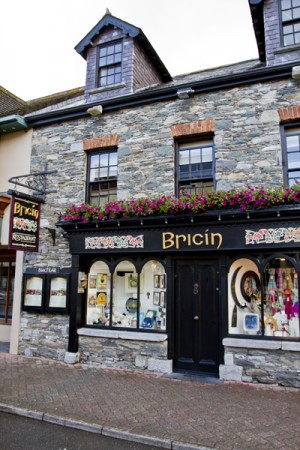When I climb the stairs leading to Bricin, the High Street restaurant where we’re meeting Mr. O’Connor for dinner, there’s Johnny McGuire, looking a bit flushed. Mr. O’Connor isn’t here yet, says Johnny, which is just as well since your table isn’t ready. But maybe you’d like a glass of wine while you wait. I do and Johnny runs off to fetch it. He gives a good pour, the purple wine practically rimming the top of the glass.
Johnny and his brother, Paddy, opened Bricin (which is the Gaelic word for “little trout”) 20 years ago this November. Johnny, who looks a bit like the older Johnny Carson—devilish grin, twinkly eyes, sparse hair—is the front man. Me brother is deathly afeared of ever meeting any of our diners, he says. Johnny on the other hand was made for this role. If he doesn’t know you when you first walk in, you’ll be best buds for sure by the end of your meal.
It’s interesting about Bricin. Every hotel in Killarney will tell you that you have to dine here. But the food really isn’t anything special. The salmon is fine as is the rack of Kerry lamb but it’s basically just traditional Irish fare. Which is maybe why people like it. It reminds them of their mudder’s cooking, only better.
Once Mr. O’Connor arrives and settles in, we all order the same thing: boxty. The minute the waitress takes my menu away, I regret my choice. Ordering boxty—a potato pancake cooked on the griddle and filled with lamb and vegetables or chicken and veggies—is like ordering a bowl of chili at a roadside diner in New Mexico or pizza in Chicago.
In fact, the boxty is a bit gummy, as you’d expect, and the lamb chunks tough and the veggies overcooked. Just the way your oul grannie would make it. As I’m pushing it around my plate, Johnny comes over and starts telling a story about the Moynihan family who once lived where the restaurant is now. This was in the latter part of the 19th century, during The Famine, when the family sent many of their children off to America in hopes of a better life. Johnny says they found some of the letters from one of the sons, Jeremiah Moynihan, when they started construction of the restaurant. It was a sad, sad story, says Johnny. No money in Ireland and everyone starving and the children who’d been sent to America not doing much better. He complains bitterly in his letters about being sent to New York and wanting to come home, says Johnny, but every letter he gets from his mudder is about The Famine and deaths in the family. The family just wasted away, says Johnny.
And then he’s off to visit another table as I have another stab at my boxty which, now that I think about it, tastes pretty damn fine.


Recent Comments